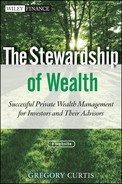Chapter 18
Managing Investment-Related Taxes
I don't want to achieve immortality through my work. I want to achieve immortality through not dying.
—Woody Allen
Alas, like death, taxes are one of the few certainties investors face. Indeed, for most family investors, most of the time, taxes will prove to be the single largest drag on investment returns. Uncle Sam is our investment partner, and Governor Bill is also usually along for the ride, and sometimes even Mayor Benny. Thus, although tax avoidance should never be the sole motive for any investment decision, it is crucial that family investors take tax concerns into account.
But before we discuss effective tax management of our portfolios, let's pause a moment to emphasize the point about avoiding tax-motivated decision making. Much of the time, structuring an activity in a way that minimizes taxes will bring with it other costs. Sometimes these costs may be actual financial costs—as when we select an underperforming tax-aware manager over an outperforming gross-returns manager, or when we fail to diversify a concentrated stock position. Setting up strict trusts for our children or grandchildren can save money on taxes, but it can also ruin those people, turning them into trust fund babies even before they are born.
Another problem with managing investment-related taxes is that the tax issue is almost always conflated with risk in such a way that investors are typically faced with choosing between lower-taxes-and-higher-risk, or higher-taxes-and-lower-risk. Thus, to obtain capital gains tax treatment, we must typically hold our assets for at least one year (higher risk). We can lower our risk by buying assets that will (or can) be sold in a month, but that will subject us to higher ordinary income or short-term capital gains taxes.
